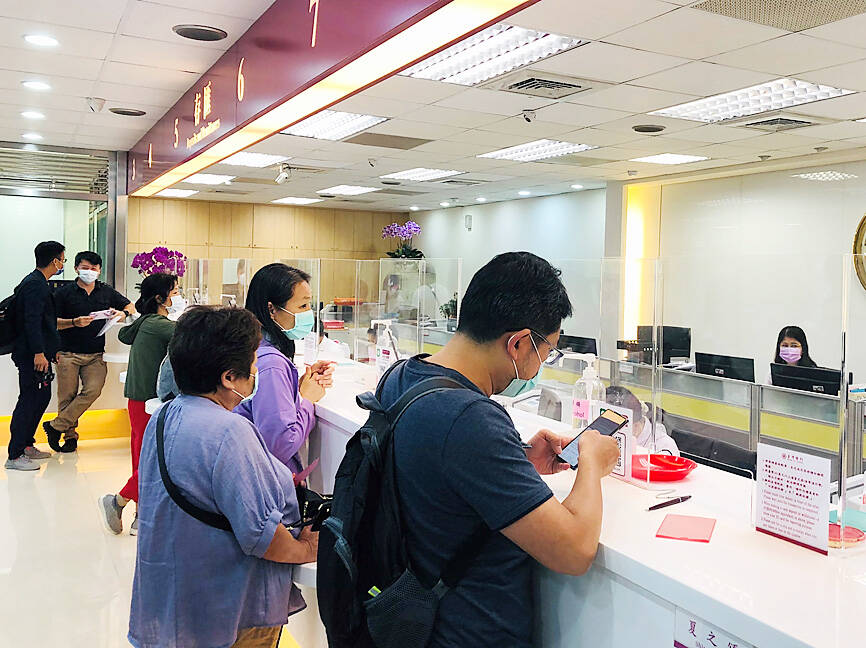The Bankers Association of the ROC (銀行公會) yesterday introduced a relief measure aimed at shoring up local companies hit by liquidity pressures following the US’ announcement of a 32 percent “reciprocal” tariff on Taiwanese goods on April 2 — a move that was followed by a 90-day reprieve a week later.
The measure, approved by the Financial Supervisory Commission, was to take effect after member banks were notified yesterday, it said.
Under the plan, companies that remain operational and continue to meet their debt and interest obligations may apply for a six-month extension on principal maturing due before Dec. 31, it said.

Photo: Kelson Wang, Taipei Times
For new loans issued under the government’s program to mitigate the impact of tariffs, lenders should ease collateral requirements, the association said.
Specifically, if the Small and Medium Enterprise Credit Guarantee Fund of Taiwan (信保基金) provides a guarantee covering more than 80 percent of the loan, banks should refrain from requesting additional guarantors beyond the company’s responsible parties, and should avoid asking for deposits as collateral, it added.
Financial institutions have also been instructed to expedite loan processing to ensure the timely release of funds, it said.
The measures are aimed at providing critical liquidity support and mitigating operational risks for Taiwan’s export-oriented businesses amid rising global trade tensions, it added.
Small and medium-sized manufacturers of non-tech products are considered less financially equipped to weather external shocks, it said.
The association has also urged banks to adopt a streamlined credit assessment process.
For loans that are fully guaranteed, banks may waive the requirement to collect audited financial statements and instead adopt simplified credit review procedures, it said.
In cases where loan guarantees are only partial and the new borrowing exceeds NT$30 million (US$924,214) after new borrowing, audited financial statements may be submitted within three months, the association said.
Loans of NT$15 million or less should also qualify for simplified reviews, it added.
As for existing debt, businesses seeking to extend loans totaling up to NT$200 million that are due to mature before the end of this year may be exempt from providing updated financial projections, the association said.

Taiwan will prioritize the development of silicon photonics by taking advantage of its strength in the semiconductor industry to build another shield to protect the local economy, National Development Council (NDC) Minister Paul Liu (劉鏡清) said yesterday. Speaking at a meeting of the legislature’s Economics Committee, Liu said Taiwan already has the artificial intelligence (AI) industry as a shield, after the semiconductor industry, to safeguard the country, and is looking at new unique fields to build more economic shields. While Taiwan will further strengthen its existing shields, over the longer term, the country is determined to focus on such potential segments as

UNCERTAINTY: Innolux activated a stringent supply chain management mechanism, as it did during the COVID-19 pandemic, to ensure optimal inventory levels for customers Flat-panel display makers AUO Corp (友達) and Innolux Corp (群創) yesterday said that about 12 to 20 percent of their display business is at risk of potential US tariffs and that they would relocate production or shipment destinations to mitigate the levies’ effects. US tariffs would have a direct impact of US$200 million on AUO’s revenue, company chairman Paul Peng (彭雙浪) told reporters on the sidelines of the Touch Taiwan trade show in Taipei yesterday. That would make up about 12 percent of the company’s overall revenue. To cope with the tariff uncertainty, AUO plans to allocate its production to manufacturing facilities in

COLLABORATION: Given Taiwan’s key position in global supply chains, the US firm is discussing strategies with local partners and clients to deal with global uncertainties Advanced Micro Devices Inc (AMD) yesterday said it is meeting with local ecosystem partners, including Taiwan Semiconductor Manufacturing Co (TSMC, 台積電), to discuss strategies, including long-term manufacturing, to navigate uncertainties such as US tariffs, as Taiwan occupies an important position in global supply chains. AMD chief executive officer Lisa Su (蘇姿丰) told reporters that Taiwan is an important part of the chip designer’s ecosystem and she is discussing with partners and customers in Taiwan to forge strong collaborations on different areas during this critical period. AMD has just become the first artificial-intelligence (AI) server chip customer of TSMC to utilize its advanced

Chizuko Kimura has become the first female sushi chef in the world to win a Michelin star, fulfilling a promise she made to her dying husband to continue his legacy. The 54-year-old Japanese chef regained the Michelin star her late husband, Shunei Kimura, won three years ago for their Sushi Shunei restaurant in Paris. For Shunei Kimura, the star was a dream come true. However, the joy was short-lived. He died from cancer just three months later in June 2022. He was 65. The following year, the restaurant in the heart of Montmartre lost its star rating. Chizuko Kimura insisted that the new star is still down